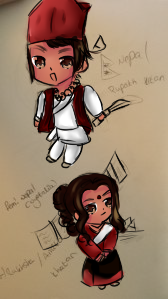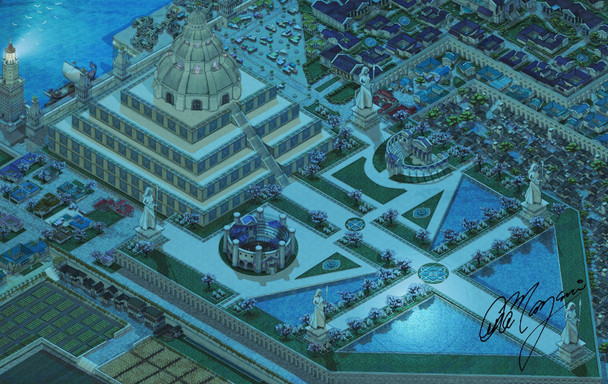HOME | DD
 Jazzy-Strings — Grenada Ref
Jazzy-Strings — Grenada Ref

Published: 2014-11-02 15:49:37 +0000 UTC; Views: 1547; Favourites: 7; Downloads: 0
Redirect to original
Description
AHHHHH HERE SHE ISSSS!!!!My new Hetalia OC, Grenada! Let's get right to it, shall we?
Country Name: Grenada
Capital: St. George's
Population: ~106,000
Continent: Americas (Caribbean)
Languages: English (official), Grenadian Creole English and Grenadian Creole French
Religion: Roman Catholic
Human Name: Shariya Mitchell
Human age: 16/17
Birthday: 7th February (Independence from the UK)
Hair: Dark brown 'afro'
Eyes: Chocolate
Nicknames: Gren, Shari, Nada, Mitch
History: On March 17th 1649, a French expadition consisting of 203 men found a permanent settlement on Grenada. Within months this led to conflict with the natives which lasted until 1654 when the island was completely under French control. The natives who survived either left for neighbouring islands or went to rural parts of Grenada. The last notable communities disappeared during the 1700s. Conflict continued during the 1600s between the French on Grenada and the Caribs of present day Dominica and St. Vincent and the Grenadines. The economy was initially based on sugar cane and indigo (though, now the main economic factor is Nutmeg). The French established a capital known as Fort Royal (now St. George)
The British captured Grenada during the Seven Years' War in 1762. Though, Grenada wasn't formally ceded to Britain until the Treaty of Paris in 1763. The French re-captured the island during the American War of Independence, Comte d'Estaing winning the naval Battle of Grenada in July 1779. However the island was given back to Britain with a Treaty of Versailles in 1783. However, there was a pro-French revolt in 1795–1796. (The British won)
Nutmeg was introduced to Grenada in 1843 when a merchant ship called in on its way to England from the East Indies. The ship had a small quantity of nutmeg trees on board which they left in Grenada, Grenada now supplies nearly forty percent of the world's nutmeg. In 1877, Grenada was made a Crown colony, and by 1922 the wealthiest 4% of Grenadians could vote.
In 1950, Eric Gairy founded the Grenada United Labour Party, initially as a trades union, in 1951 it lead a strike for better working conditions. This caused a lot of unrest—so many buildings were set ablaze that the disturbances became known as the 'red sky' days—and the British authorities had to call in military reinforcements to help regain control of the situation. On October 10, 1951, Grenada held its first general elections on the basis of universal adult suffrage, with Gairy's party winning six of the eight seats available.
On March 3, 1967, Grenada was granted full autonomy over its internal affairs. Independence was granted in 1974 under Eric Gairy, who became the first Prime Minister of Grenada. However, civil conflict gradually broke out between Eric Gairy's government and some opposition parties including the New Jewel Movement. Gairy's party won the elections in 1976, but the opposition did not accept the result, accusing it of fraud. In 1979, the New Jewel Movemen launched an attack on the government, overthrowing it.
The constitution was suspended and Bishop's "People's Revolutionary Government" ruled subsequently by decree. Cuban doctors, teachers, and technicians were invited in to help develop health, literacy, and agriculture over the following years.
Some years later a dispute developed between Bishop and certain high-ranking members of the NJM. Though Bishop cooperated with Cuba and the USSR (now Russia) on various trade and foreign policy issues, he wanted to maintain a "non-aligned" status. Bishop had been taking his time making Grenada wholly socialist, encouraging private-sector development in an attempt to make the island a popular tourist destination. Hardline Marxist party members, including Communist Deputy Prime Minister Bernard Coard, deemed Bishop insufficiently revolutionary and demanded that he either step down or enter into a power-sharing arrangement.
On October 19, 1983, Bernard Coard and his wife Phyllis, backed by the Grenadian Army, led a coup against the government of Maurice Bishop and placed Bishop under house arrest. These actions led to street demonstrations in various parts of the island. Bishop had enough support from the population that he was eventually freed after a demonstration in the capital. When Bishop attempted to resume power, he was captured and executed by soldiers along with seven others, including government cabinet ministers. The Coard regime then put the island under martial law. After the execution of Bishop, the People's Revolutionary Army (PRA) formed a military government with General Hudson Austin as chairman.
The overthrow of a moderate government by one which was strongly pro-communist worried the US. Particularly worrying was the presence of Cuban construction workers and military personnel who were building a 3 km airstrip on Grenada. Bishop had stated the purpose of the airstrip was to allow commercial jets to land, but U.S. military analysts argued that the only reason for constructing such a long and reinforced runway was so that it could be used by heavy military transport planes. The contractors, American and European companies, and the EEC, which provided partial funding, all claimed the airstrip did not have military capabilities. Reagan was worried that Cuba – under the direction of the Soviet Union – would use Grenada as a refueling stop for Cuban and Soviet airplanes loaded with weapons destined for Central American communist insurgents.
On October 25, 1983, combined forces from the US and Regional Security System invaded Grenada in an operation called "Operation Urgent Fury." While the Governor-General of Grenada, later stated that he had requested the invasion, it was highly criticised by the governments of Britain, Trinidad and Tobago, and Canada. The UN said it was "a flagrant violation of international law". The UN Security Council considered a similar resolution, which failed to go forward because it was vetoed by the US
When U.S. troops withdrew from Grenada in December 1983, Nicholas Brathwaite was appointed prime minister until elections could be organized. The first elections since 1976 were held in December 1984 and were won by the Grenada National Party
On September 7, 2004, after being hurricane-free for forty-nine years, the island was directly hit by Hurricane Ivan. Ivan struck as a Category 3 hurricane and damaged or destroyed 90% of the island's homes. On July 14, 2005, Hurricane Emily, a Category 1 hurricane at the time, struck the northern part of the island with 80-knot (150 km/h; 92 mph) winds, causing an estimated $110 million (EC$ 297 million) worth of damage.
Friends: Canada, China, Haiti, Cuba, Palestine, England, United States
Cautious around: South Korea
Possible crushes: America (To be explained later...)
And that's it! I'm really proud of her //shot
Related content
Comments: 1

She's so interesting looking! I would love to see her personality!
👍: 0 ⏩: 0

























